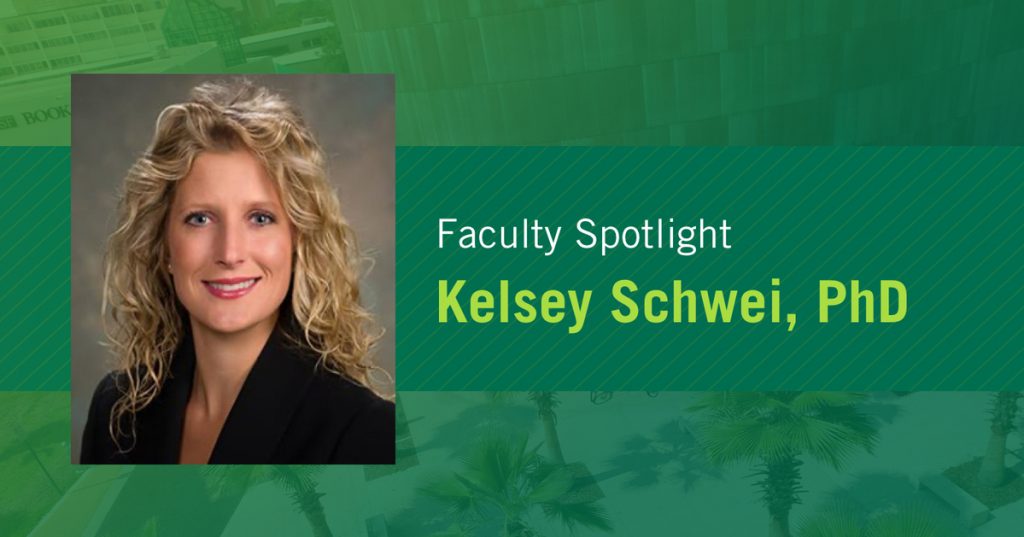From an early age, Kelsey M. Schwei, PhD, was always tech savvy. By the time she entered college, she had a love for data and computers as well as healthcare.
“During undergrad, I was pre-med and wanted to be a nurse practitioner, but decided I liked technology instead,” Schwei explains. “I found my niche in computers.”
After earning her B.S. in Health Science from Texas A & M University, Schwei was working for a software company when she started researching how to best combine her passions and came across health informatics. “It felt like a natural pivot, a natural progression, to find informatics,” she says.
Schwei’s research into programs led her to the University of Wisconsin – Milwaukee’s M.S. in Health Care Informatics, eventually earning her doctorate in Biomedical and Health Informatics from the school in 2015. Her tech savvy and real-world application of informatics led Schwei to be something of a trailblazer in distance learning at UW-Milwaukee, sowing the seeds for her role as a professor and mentor to future online students.
While pursuing her master’s degree, Schwei completed an internship at the Marshfield Clinic, within their Biomedical Informatics Research Center, conducting informatics research. Her research project led to a full-time informatics position at the Clinic. There was just one problem: The Clinic was four hours away from the UW-Milwaukee campus.
This led Schwei to tap into her tech savvy and become a distance education student, even though the program was designed to be on-campus. “Their program was not an online program, but because of my research position, the faculty was willing to make it a distance education program [for me],” Schwei says.
In this unique learning environment, she learned the importance of communication and engagement between professor and student in the online class setting. “I learned what I liked and disliked from my professors,” Schwei explains, learning from their teaching styles as much as from their courses.
As Schwei moved into academia full-time, the value of her doctoral experience stayed with her, informing her instructional style, as she now teaches for five different universities online. When she joined the faculty of the Health Informatics Graduate Program in the University of South Florida’s Morsani College of Medicine, she found the program that, in many ways, seems to have been made for her teaching style. “I have been with USF since 2016…and in 2016, a strictly online informatics program was hard to find,” recalls Schwei.
While attending the annual American Medical Informatics Association (AMIA) Conference in Washington, D.C. Schwei saw the USF Health booth. In learning about the informatics program, Schwei “liked what USF had to offer — being in an online platform, within a medical school, and non-traditional students,” she says. “It seemed like a really natural fit for me.”
Bringing Real-World Experience to the Online Classroom
In teaching the Integrated Electronic Medical Records and e-Medicine Business Models courses in the Master’s in Health Informatics program, Schwei sees students that, in many ways, remind her of herself, as she worked full-time as a researcher while studying online in pursuit of her graduate education.
“I have a number of students who are MDs, working as physicians during the day and doing their schooling online at night,” she says. “Because they have that experience, they’re able to bring their careers into the course, bring that real-world application.”
These non-traditional students who are experienced working professionals bring a “thirst for further knowledge and career advancement,” says Schwei. “It’s unique to USF.” The professional experience of the USF students leads to immediate real-world application of the concepts she teaches.
Schwei’s e-Medicine Business Models course is a diagramming and modeling course for process improvement, in which students complete a process project that is healthcare related, preferably in an area in which they are familiar and in need of process improvement.
“The course is so hands-on and is a different type of course than most courses,” Schwei says. “In most courses, it’s read the textbook, take an exam…”
Schwei’s students often share how they are applying the concepts of the course in their current roles, even reviewing their process improvement models with her before presenting them to the decision-makers within their organizations, asking her, “’Does this make sense?’ or “’How can I improve it?’” she says. “We’ll review it together. It also gives me really great feedback about the course, which I love to hear from students.”
This trust Schwei has built with students and the positive feedback her courses have received reflect her focus on communication and engagement with her students. “Engagement is my number one strong point—being there, sharing my experiences,” she says. “My teaching philosophy is students should be taught in a way that addresses their learning style, while still being respectful of a stimulating atmosphere that nourishes their expectations and accountability. I [strive to] foster a student-centric learning environment.”
This teaching philosophy is rooted in her own experience as an independent online student and the observations she made of her own professors: “Always be available and respond as quickly as possible.” It’s a philosophy she also encourages in her students, both in their classwork and professional work.
“Peer feedback, as well as my feedback, is a great way for students to learn, so the students are learning from each other,” she says. “Discussion boards are a great tool for that.” Students often bring their personal experiences to the discussion boards, where “good dialogue goes on between the students there,” says Schwei of her students’ engagement and interactions. She also uses the course discussion boards to share current events and news in the field, whether it be a story on a patient data breach or information on new regulations or best practices.
“Just Go For It!”
To prospective students considering USF Health’s online master’s degree or graduate certificate programs in health informatics, Schwei says, “Go for it. You can’t go wrong with more education.” Schwei emphasizes that continual education is needed in this “field that is ever-changing and evolving… Healthcare delivery is an information-intensive set of processes. Technology systems are creating unfathomably large amounts of big data, so storing the data, sharing the data, and processing the data all needs to be addressed in the future.”
Health informatics professionals are needed to meet the changing government regulations and technology challenges around patient data security, interoperability, and addressing who owns the data, and “each time a new technology comes out, it changes, so it’s ever-evolving,” emphasizes Schwei.
USF Health’s Master of Science in Health Informatics, with engaged faculty like Kelsey Schwei, is educating professionals to meet these challenges. Schwei emphasizes: “If you’re looking to advance your career, you can’t go wrong with a degree from USF. Just go for it!”



